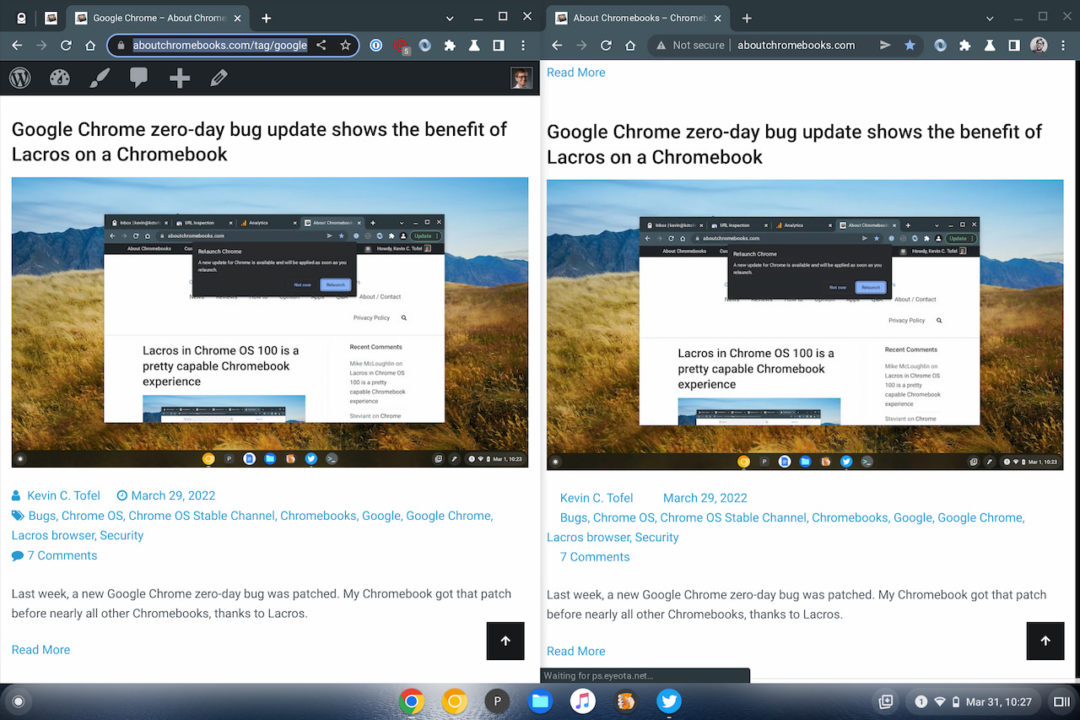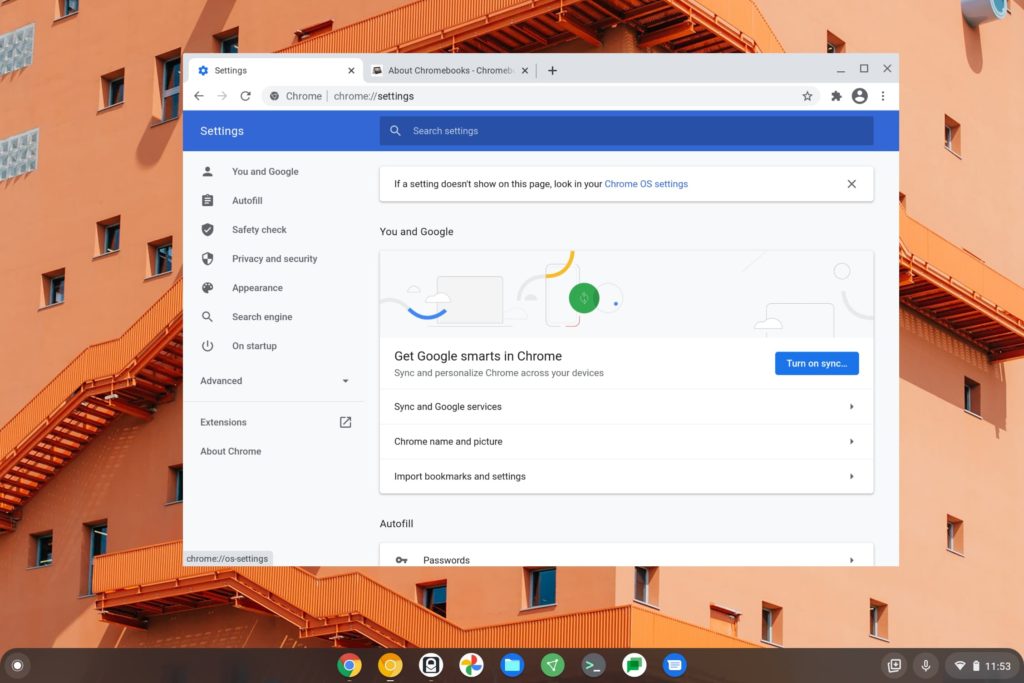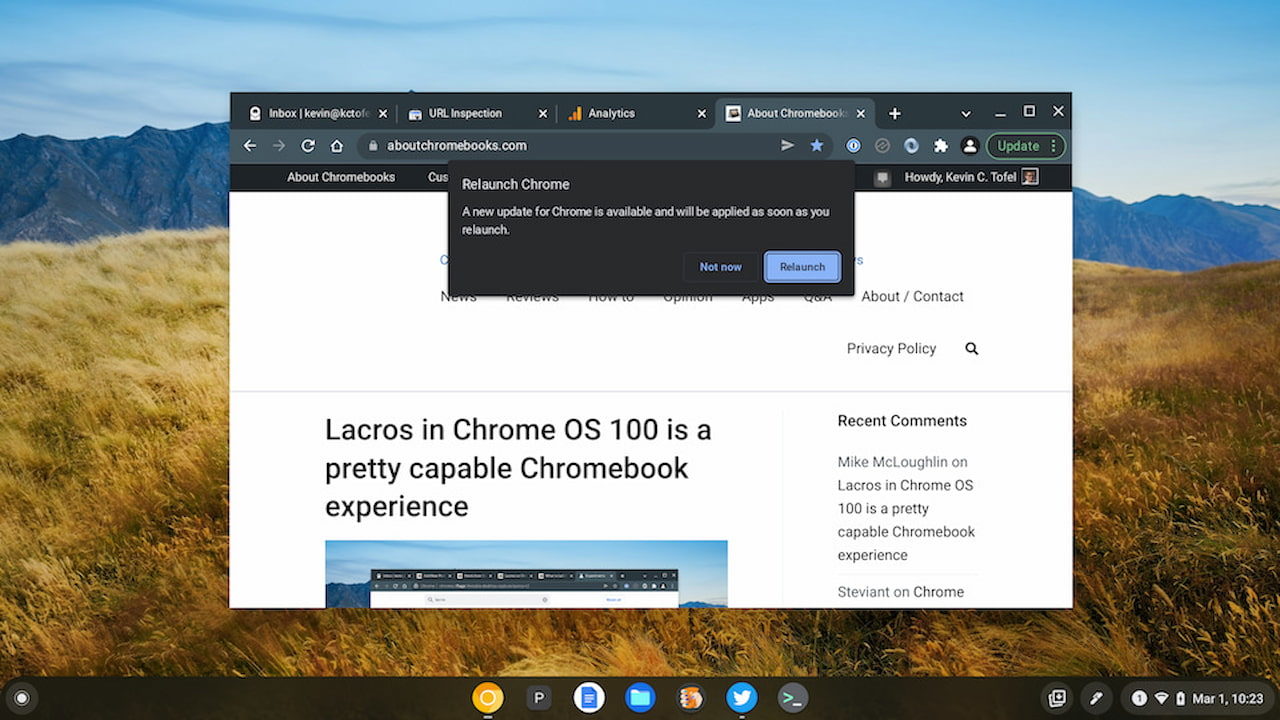Tomorrow will be four years to the day that I started this site.? And every day since then I’ve kept coverage to Chrome OS and Chromebooks, along with the occasional bit about Chromebases or Chrome OS tablets. As Google’s effort to unbundle the Chrome browser from the Chrome OS platform nears completion, I think it’s time to include more Google Chrome browser coverage.
That effort I mention is Lacros, which stands for Linux And ChRome OS. I know I’ve written about it a bunch lately, but I’m not sure that the majority of Chrome OS users are truly familiar with it.
Chrome OS vs Google Chrome
To help with that, I documented what Lacros is compared to Google Chrome and Chrome OS here. So I won’t rehash it now.
Suffice it to say that the current default browser in Chrome OS is getting decoupled from the platform. In its place will be the Linux version of Chrome, which I’ve been using full time on my Chromebook for several weeks. It’s essentially the same experience.

Since the default Chrome OS browser will be a separate application, running on a virtual machine, software updates on Chromebooks will change a little.
Chrome OS updates will happen every four weeks, as they do now. But, once the Chrome browser is pulled out of the operating system, it can get updates at any time. And I think it makes sense to share information on those updates, just as I do with Chrome OS.
The benefits of Google Chrome as a separate Chromebook app
A perfect example is the recent high severity Google Chrome bug from last week.
It was fixed in the browser for Windows, macOS, and Linux then pushed out to those devices. Chromebooks and other Chrome OS devices got it a few days later because it required a full-blown Chrome OS update. Since I’m actually using Lacros on my Chromebook, I was patched right away.
From my perspective, do I cover that update twice: Once for Chrome OS devices and once for the Chrome browser? That seems silly, which is why I didn’t.
But there will be times in the future when something changes in Chrome OS that doesn’t affect the browser or vice versa. And I’ll want to cover both of those situations, assuming they’re important enough to cover.
On a related note, there are two sets of experimental flags on my Chromebook. One set is for Chrome OS and one is for the Chrome browser. Each has its own different settings as well, as shown below.

So again, expanding the site to include more Google Chrome news bits, tips, updated features, etc… will simplify things.
At least, that’s how I’m thinking about it. However, I don’t want to waste a reader’s time.
Think it over and let me know your thoughts in the comments. I already created a Google Chrome tag on the site in anticipation of this. That doesn’t mean I have to use it going forward though, so chime in and tell me what you think.



12 Comments
Happy 4 years, Kevin! Thanks for all you do and all you share
Your site is the only place where I get complete Chromebook coverage. Thanks for your efforts to keep us users informed.
I’m for any news on anything Google product related from you, thanks 🙂
What’s the upshot? Chrome OS updates are already best in class, and as painless as I can imagine for an OS update. I realize people do things on their Chromebooks other than run Chrome, but the amount of friction created by requiring a restart of the browser and a restart of the whole machine are almost identical…
I hear you on the friction but I’d rather deal with that and have an updated browser whenever possible instead of every four weeks. 😉
It’s likely that this decoupling will cause at least some amount of confusion.
I’m confident this site will be a great resource for working through the transition.
(and beyond)
Is this the finals nail in.the coffin of a lightweight OS for minimal hardware?
Tl;dr
My take on the original Chromebook idea was Linux.OS with the GUI based on html/css/JavaScript. That makes the browser, kind of, the window manager. A bit like how Jobs made bsd unix work by ditching X. That makes for a light weight platform, not needing X. Then VMs are added for security and that enables Linux and Android (and Windows) apps. They each have their own window manager needs; but the browser is still in charge. Now the browser is a second class citizen.
I can understand your point. But the GUI is written in C/C++. The user interaction may be more based on a web stack, but the native apps generally aren’t. So moving from an integrated Chrome browser to one that runs on Linux won’t change that much. The VM may add a little overhead for s slight performance degradation but I don’t think it will be noticeable. I can’t perceive any difference using Lacros on a 2018 Chromebook, although it’s more of a high end configuration for it’s time.
I’m all for Google Chrome coverage in addition to the terrific Chrome OS coverage you provide us. I know a lot of us would like to see LaCros as a solution to the fleet of older Chromebooks that have passed end of life updates. Not sure if that will happen or not. At this early stage it doesn’t appear Chrome Flex will be an alternative for that. So all of my cards are on Lacros.
I have just loaded a couple of linux apps which I am thinking of using going forward (TextMaker and OpenShot in case you are interested). If they are unbundling Chrome from the OS, why don’t they just release Chrome OS as a regular linux laptop with the ability to run Chrome LaCros seamlessly? As long as they could hide the linux complexity from people like me who just aren’t interested, that would keep CB’s going as they are.
That would suit two groups of people: those like me who want to use the CB as basically what it has always been and, secondly, it would suit the linuxheads who are desperate for anything linux.
Good question, Richard! I think Google really wants to guarantee security with Chrome OS so I don’t think it will ever change to a “traditional” Linux system. Keeping Linux in a container ensures they still have some control when it comes to security and updates on the Linux side. But a dedicated Linux app section in the Google Play Store would help hide some complexity for those who don’t want to see it.
I love your coverage, been reading for a long time although I’m not fluent in programming and linux issues, just a nontech tech nerd 🙂 Just curious from reading this though, does that mean at some point Chrome could offer a full browser on other devices like android ( so you could finally get a desktop class chrome experience on tablets) or is this just a specific ChromeOS plumbing fix?